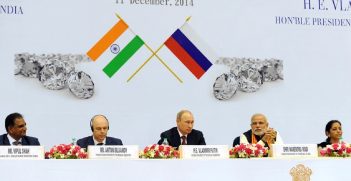Chinese Gunboats and the Rise of a Naval Power

The revelation that China had a spy ship off Australia’s coast recently is only part of a bigger story. With activities in Africa and naval exercises with Russia it appears China is flexing some strategic muscle, raising questions for Australian policymakers.
Australian media reported recently that the Chinese navy (PLA-N) had an intelligence vessel off the coast of Queensland monitoring military exercises between Australia and the United States. But this is only part of a larger narrative demonstrating the development of China into a confident maritime power.
In the past week, three Chinese naval deployments have raised the eyebrows of defence and foreign policy analysts. The first was off Australia. The second saw PLA-N vessels sail for Djibouti to establish a Chinese military base. The third is a military exercise presently underway in the Baltic Sea with Russia.
A need for Australian anxiety?
‘Provocative’ was the word used in the headline when the ABC broke the story about the presence of the Chinese navy off the Australian coast during the Talisman Sabre exercises. Contentious though it was as an intelligence platform, the fact is the vessel was in international waters. Australian defence practitioners will naturally be alert to the regional presence of the Chinese PLA-N but, as Minister for Foreign Affairs Julie Bishop stated, “China is entitled to have its vessels navigate international waters, just as Australia is entitled to navigate in international waters.”
The Chinese navy is growing, becoming a true blue water navy. Sitting off the coast of another nation for the purposes of gathering intelligence is nothing new. For centuries the great navies have engaged in this: the Spanish, the British, the Soviets and the Americans. As China develops its blue water capacity, there will undoubtedly be similar occurrences in Australia’s corner of both the Pacific and Indian oceans.
Baltic Sea exercises with Russia
Far from its Asian backyard, China’s strategic intent is becoming apparent. According to NATO, there are three Chinese vessels presently engaged in a joint exercise with the Russian navy. There are two important points here. First is that the PLA-N is operating in the Baltic Sea. The second is that the exercise is off the coast of Kaliningrad. This exercise will be a source of great concern for western strategic analysts.
Kaliningrad is of great strategic importance to Russia. It is prized Russian territory jammed between Lithuania and Poland, both of which are NATO members. In recent times NATO has increased its commitment to members in the Baltic region much to the consternation of Russia which sees the Baltic as its own domain. Though Moscow and Beijing state that the exercise is simply military training, it is also a clear signal. Any move NATO and the United States make that is not in the interests of Russia or China will be countered.
In sending ships, including a guided missile destroyer to the Baltic Sea, China wants to show it has the naval reach to operate anywhere in the world. It appears that Beijing is confident and willing, perhaps even determined, to wade into strategic theatres from which it has previously been far removed.
Again, this should not come as a complete surprise: Russia and China have shown in the recent past that they are looking for ways to cooperate. They have done so with energy. Among several other examples, a recent report for the Stockholm Peace Research Institute (SIPRI) points to Sino-Russian activities in the Arctic. This naval exercise represents another potential level to the relationship.
Djibouti and a new Chinese base
The third strategic move saw Chinese naval vessels sail recently for Djibouti. The small country on the Horn of Africa will be the home of China’s first overseas military base. This location has immense strategic importance as it sits adjacent to the Red Sea and the Gulf of Aden. This chokepoint is the gateway between the Suez Canal and the Indian Ocean.
The main sea route of China’s Belt and Road Initiative (BRI) passes through this body of water. It connects China to the markets of Europe and beyond. The BRI necessitates the ongoing security of maritime trade. This initiative is of vital national interest for China’s future.
Though touted as an economic initiative, there is little doubt that the BRI has a strong strategic element. Given the amount of Chinese economic and development activity in Africa in the past decade it is not surprising China’s first foreign base is in Djibouti. However, it should also be noted that Djibouti also hosts French and American military bases.
What can we expect?
As China moves to capitalise on its economic power it is to be expected strategic policy will be informed accordingly. This reflects the confidence of a nation growing into its status as a great power. Indeed, in 2012 former President Hu Jintao made it clear that China should become a great maritime power. But will China be a land or maritime power?
With the US as its most obvious maritime rival, it is not surprising that China seeks to bolster its own naval forces. However other factors must be considered. Since their 1962 war, China and India have not resolved their differences. It makes perfect strategic sense for China to develop a blue water naval capability with bases to India’s west. The base in Djibouti is about the protection of the sea lanes of communication that comprise the arteries of global trade and which are so essential to China.
The recent naval activities by China leave more questions than they provide answers. What does this mean for Australia’s strategic vulnerability? What is the nature of China’s evolving relationship with Russia or overall Chinese strategic policy? To what extent will China play a more assertive role in global waters? How will the US react? Only time will reveal the answers. What is certain is that the activities discussed here indicate there will be a great deal more blue water activity by the PLA-N from this point on.
Daniel Steedman is an AIIA VIC council member and a member of the committee at the Contemporary European Studies Association of Australia. Daniel is a management consultant and is embarking on a PhD in international relations. His research interests include US foreign policy, nuclear weapons and great power rivalries.
This article is published under a Creative Commons Licence and may be republished with attribution.





